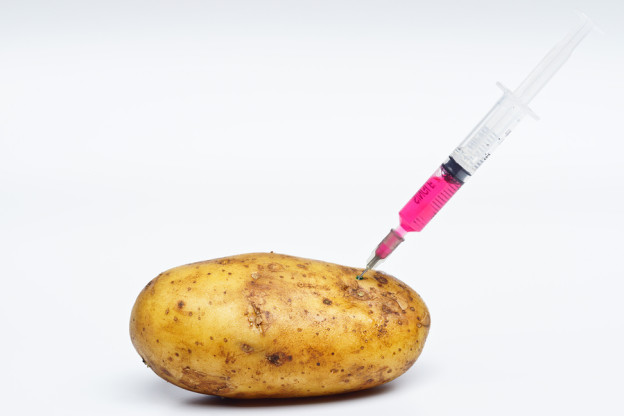By David Blyweiss, M.D., Advanced Natural Wellness
April 22, 2016
- What the FDA has to say about “natural” food
- How to guarantee 100% natural food all of the time
- Tell the government what you REALLY think
How often do you stand in front of the refrigerator or kitchen cabinet, trying to decide what you’re going to eat?
Well, if you lived a few centuries ago, you wouldn’t have had much of a choice. Your only option would have been to eat whatever was available. And your selections would be pretty slim.
If freshly caught meat was available you’d dive into it with relish. But more often than not, you’d end up gathering berries, herbs, nuts and other plant-based foods for your next meal.
These days, eating is much more complicated. And it’s not nearly as healthy – even when it sounds like it is.
Here’s the problem…
Even when you choose to eat wholesome foods, they may not be as natural or nutritious as you think they are. This is especially tricky when it comes to foods that are labeled 100% natural.
MD Exposes the Hidden Danger to Your Eyes

When your eyesight starts to fail, it's a real problem. Suddenly you can't go to the grocery store... you can't get to the doctor if you have an emergency... you can't meet your friends for dinner…
Your "regular" doctor doesn't have time to keep up with the latest research. And the same goes for eye doctors. They go to school to learn how to fit you for glasses and contacts, but have no way of preventing the damage and loss of eyesight that threatens your freedom and independence.
Let me show you something that explains a LOT about how your eyes work.
In my FREE Special Report, I'll show you a HUGE, untapped resource for your eyes that safely and naturally restores clear, effortless eyesight.
Click here to get started...
You might think this means the foods are GMO free, contain no additives and are lower in salt, sugar and calories. But that’s not the case.
You see, the FDA’s definition of “natural” is pretty vague. As far as the FDA is concerned, it simply means nothing artificial or synthetic has been added to a food that you wouldn’t already expect to be in it.
Does this mean you expect 100% pure and natural vegetable oil to come from genetically altered corn, canola and soy crops?
Do you expect meats that claim to be “all natural” to come from animals that eat GMO feed and are pumped full of antibiotics and hormones?
I don’t think so. But there’s no law against these claims, just as long as there’s nothing artificial added during the processing of the product.
“Natural” Ingredients Gone Wrong
GMOs aren’t the only unnatural things hiding in your healthy-sounding foods. There are also a boatload of “natural” ingredients aren’t really natural at all.
For example, hydrolyzed protein sounds quite healthy. But in reality, it may indicate hidden MSG. Carrageenan and maltodextrin are other natural ingredients that can clue you in to concealed MSG.
And what about citric acid? It sounds harmless enough. After all, it comes from citrus fruit, right?
Well, yes and no. You can get it from fruit. But there’s a more economical form of citric acid that’s much cheaper for food manufacturer’s to get their hands on.
The World's Quickest Solution for Ending Prostate and Urinary Misery
This has recently been revealed to be one of the only real breakthroughs in prostate health.
The seeds of a strange fruit (sometimes called "Chinese Apples") hold powerful phytonutrients that are a revolution in prostate health.
In fact, UCLA and Veterans Administration research have now proved this to be true.
Not only that, but it may be the worlds quickest solution for ending prostate misery.
Simply stated, these phytonutrients represent a huge step beyond beta sitosterol, saw palmetto, and other phytosterols alone.
Simply click HERE if you want to have fast prostate relief...restful, uninterrupted sleep...no more constant "urges to go"...enhanced virility...and optimal prostate support for life.
It’s made out of black mold. You know… the kind that grows in your house and makes you sick. (Need I say more?)
And there’s a natural ingredient that I find absolutely repulsive. It’s called castoreum and it’s used to create strawberry, vanilla and raspberry flavors.
While that might sound yummy, the truth of the matter is this: Castoreum is a smelly and oily anal substance that beavers excrete – along with urine – to mark their territory.
Now, any and all of these ingredients can be found in “natural” foods.
You also have to watch out for high sodium, sugar and HFCS content in these foods. After all… they’re considered natural, too.
So let’s get down to the nitty-gritty here.
Here’s How to Guarantee 100% Natural Food all of the Time
If you want natural food on your table, take a lesson from your ancestors. Always choose fresh, organic plant-based foods first.
If something comes in a can, jar, box or bag you can bet your bottom dollar it’s ultra-processed. Even if the label says “natural”, it’s a pretty sure bet that a lot of good stuff has been stripped out and replaced with questionable ingredients – even if the label says “natural”.
Next, choose your animal proteins wisely. And keep in mind that it’s important to consider what happens to the animal before it’s slaughtered, not just afterward. That’s why I always recommend wild-caught fish, organic free-range poultry and grass-fed meats.
But don’t stop there. Right now, you have an opportunity that only comes around once or twice in a lifetime.
In a surprising turn of events, the FDA is asking for your comments on what you expect to find in “natural” foods before they consider their next steps on natural labeling.
Click here to go to their website. Then, enter FDA-2014-N-1207 into the search box. Click the comment box next to Use of the Term ‘‘Natural’’ in the Labeling of Human Food Products; Request for Information and Comments; Extension of Comment Period add your two cents before the May 10, 2016 deadline.
SOURCES:
Lindqvist, PG et al. Avoidance of sun exposure as a risk factor for major causes of death: a competing risk analysis of the Melanoma in Southern Sweden cohort. Jnl Int Med. First published online Mar 2016.
Here comes the sun to lower your blood pressure. Univ of Southampton. News Release, Jan 2014.
van der Rhee H, et al. Is prevention of cancer by sun exposure more than just the effect of vitamin D? A systematic review of epidemiological studies. Eur J Cancer. 2013 Apr;49(6):1422-36. Epub 2012 Dec 10.
Grant WB. Ecological studies of the UVB-vitamin D-cancer hypothesis. Anticancer Res. 2012 Jan;32(1):223-36.
Littlejohns TJ, et al. “Vitamin D and the risk of dementia and Alzheimer disease.” Neurology. 2014 Sep 2;83(10):920-8.







